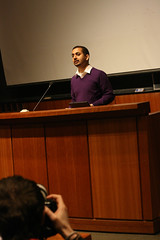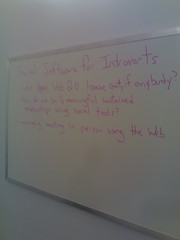Northern Voice Microblogging Presentation Debrief
Posted by Richard on Friday, 6 March 2009Here are the notes I took of a self-debrief about my Northern Voice presentation last month about microblogging. I follow most of the advice Joe Clark gives about giving presentations and agree with all of it. Every presentation, including this one, I close anything that makes a unanticipated notification or unwanted sound, load up every website I intent to show in a tab well before the presentation. I don't do this often enough in a year to get smooth at it. Presumably Bruce Sharpe, who presented directly before me, will post video and/or audio of my presentation in the near future.
What Went Right
- definitely had enough material for half an hour. I went halfway through my slides. Perfect, since the presentation was front-loaded to the first half. The second half contained bonus material.
- I kept it conversational, let people interrupt, and with maybe one exception, felt that I answered questions relatively well
- people seemed to like the presentation
- the attendees laughed at the right places
What Went Wrong
- I needed a projector adapter dongle thing, leaving it at home. Luckily I borrowed the previous presenter's dongle. I try to have my own.
- I needed the remote, which I lost sometime before the presentation. Managing without it, it would have went far more smoothly allowing me to go beyond the reach of my laptop.
- I didn't get to use the Obligatory Obama Slide (though I was unprepared for it)
- felt underprepared, not having done a proper run-through. Nobody seemed to notice.
- had the wrong setting on the laptop's monitor, not being able to see my speaking notes (which weren't detailed) and a timer
- I wore a sweater. The conference documentarians used apel mikes. Next time I won't wear a sweater.
What I Noticed, for Ill or Good
- when I made an unsubstantiated claim that between 11 AM and 4 PM is the best time to post an update to Twitter, several people in the audience wrote it down. That makes me think of what other unsubstantiated thing I can say that people.- one person came up to talk to me about it afterwards
- one person came up to me after the presentation to talk about it more. I had no expectations either way.
- at least 15 people started following me on Twitter after I put up my first slide, which had only my Twitter username identifying me. Many have since unfollowed.

